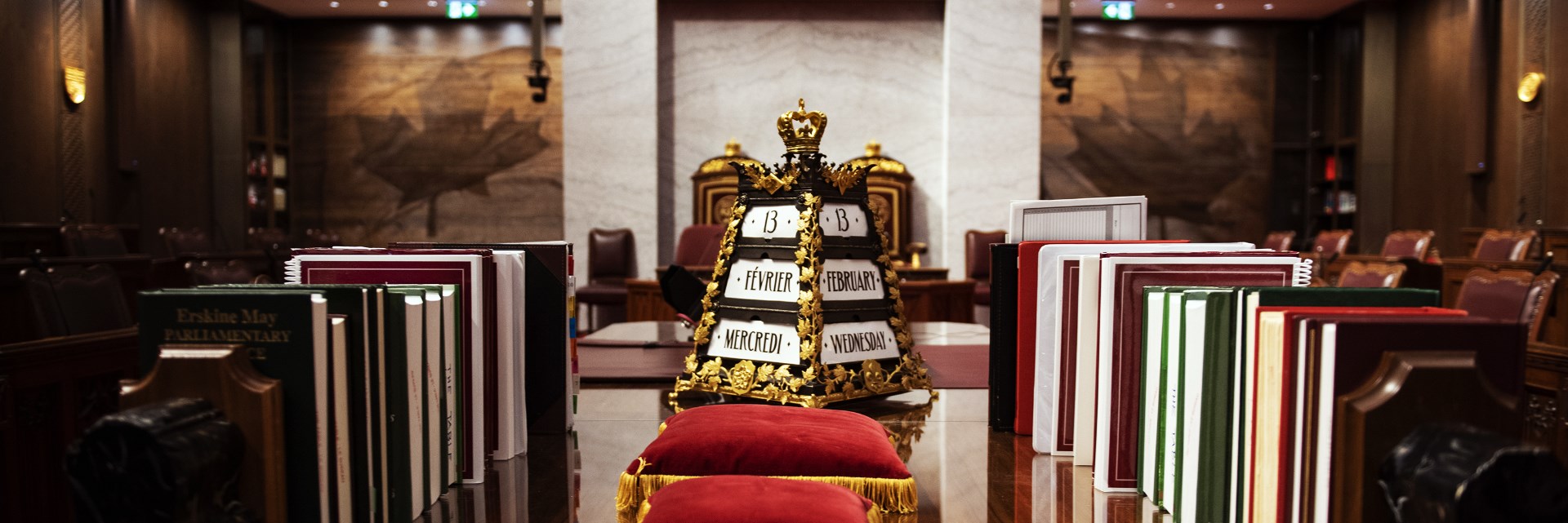Chapter Eight: Emergency Debates
Request for Emergency Debate
8-1. (1) A Senator who wishes to raise a matter of urgent public interest may request that an emergency debate be held on that subject.
8-1. (2) A written notice requesting the emergency debate shall be sent to the Clerk at least three hours before a scheduled meeting of the Senate. If the request is to be heard on a Friday, the notice must be delivered to the Clerk no later than 6 p.m. on Thursday.
8-2. (1) The notice shall briefly outline the urgent matter and explain why it should be debated. The matter proposed for debate:
(a) must relate to a genuine emergency;
(b) must not revive a request for an emergency debate already considered during the same session;
(c) must not raise any question that, according to the Rules, may be debated only on a substantive motion after notice; and
(d) must not raise an issue that is in substance a question of privilege.
8-2. (2) Upon receipt of the notice, the Clerk shall arrange for its translation and, as soon as possible thereafter, have a copy sent to each Senator’s parliamentary office and also placed on each Senator’s desk in the Senate Chamber.
8-2. (3) The non-receipt of a notice by any Senator does not affect the validity of the notice, nor can it constitute grounds to delay consideration of the request.
8-3. (1) Except as otherwise provided, when the Senate meets after a notice has been received and distributed, the Speaker shall not call for Senators’ Statements. Instead, the Speaker shall recognize the Senators who gave notice of a request for an emergency debate in the order in which the notices were received. Once debate on the first request is completed, the Speaker shall call for debate on any other distinct requests either until one is accepted as an emergency or none are accepted. All requests dealing with the same urgent matter shall be considered together.
EXCEPTION
Rule 4-4(2): When tributes or notice of a question of privilege
8-3. (2) A Senator who gave notice shall explain why the normal business of the Senate should be set aside for the emergency debate. In putting the case, the Senator shall state:
(a) how the matter concerns the administrative responsibilities of the government or could come within the scope of departmental action; and
(b) why the Senate is unlikely to have another opportunity to debate the matter within a reasonable period of time.
8-3. (3) The debate on each request shall not exceed 15 minutes. During this debate, Senators, including the Senator making the request, shall speak only once and for no more than five minutes.
8-3. (4) During consideration of a request for an emergency debate, no motion shall be received.
8-3. (5) At the end of the debate, the Speaker shall determine whether the request for an emergency debate constitutes a matter of urgent public interest, making reference to the criteria in subsection (2) and rule 8-2(1).
Process for Emergency Debate
8-4. (1) Except as provided in subsection (2), when the Senate completes the Orders of the Day, but no later than 8 p.m., or noon on a Friday, the Senator whose request for an emergency debate was accepted shall initiate the debate by moving “that the Senate do now adjourn”.
8-4. (2) An emergency debate shall not take precedence over a motion relating to a case of privilege moved earlier in the sitting. Instead, the emergency debate shall be postponed until debate on the motion has concluded or been adjourned.
8-4. (3) During an emergency debate, Senators shall speak only once and for no more than 15 minutes.
8-4. (4) During an emergency debate, no amendment or other motion, except that a certain Senator be now heard or do now speak, shall be received.
8-4. (5) An emergency debate shall conclude after a maximum of four hours. Provisions relating to the ordinary time of adjournment shall be suspended both during and after an emergency debate.
8-4. (6) The adjournment motion shall be considered adopted at the conclusion of the emergency debate, provided that:
(a) the Senate had completed consideration of the Orders of the Day before the start of the emergency debate; and
(b) the debate ends at or after the ordinary time of adjournment.
8-4. (7) If the Senate has not completed consideration of the Orders of the Day before taking up the emergency debate, the adjournment motion shall be deemed withdrawn at the conclusion of the debate, and the Senate shall resume consideration of the Orders of the Day where they were interrupted.
8-4. (8) Except as otherwise provided, if the Senate resumes consideration of the Orders of the Day after an emergency debate, it shall continue sitting until the earlier of:
(a) the adoption of an adjournment motion;
(b) the completion of the Orders of the Day; or
(c) the expiration of a period of time equivalent to that taken in the emergency debate.
EXCEPTIONS
Rule 7-3(1)(c): Procedure for debate on motion to allocate time
Rule 7-4(1)(a): Government order to which time is allocated
Rule 7-4(2): Debate to continue beyond ordinary time of adjournment and no evening suspension
8-5. There shall be only one emergency debate at any one sitting.

